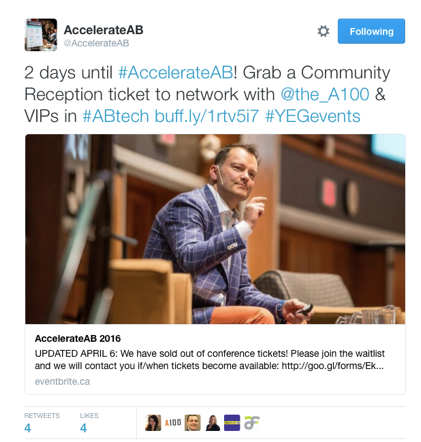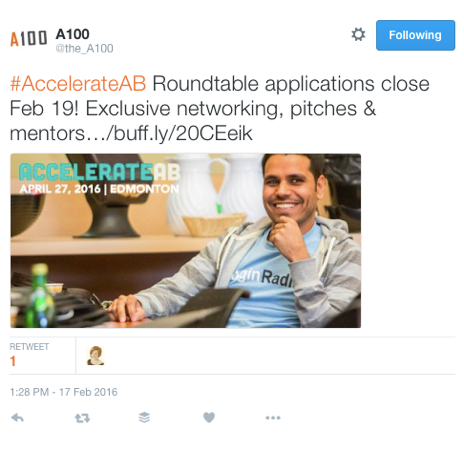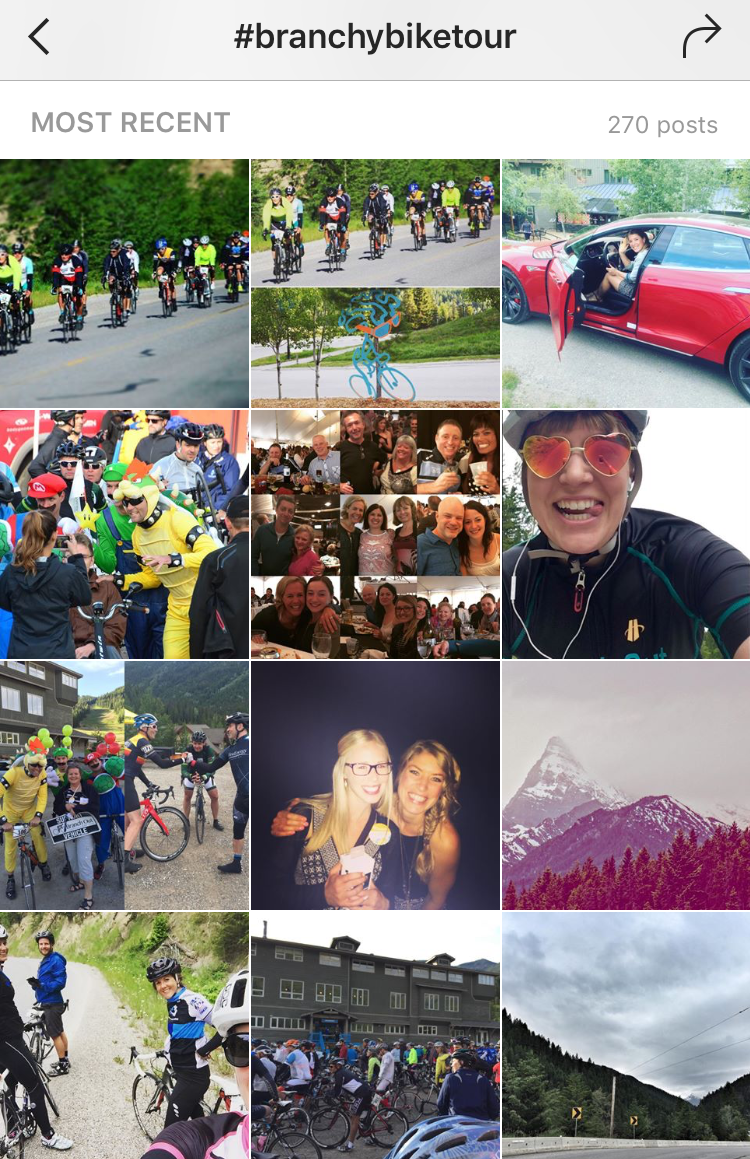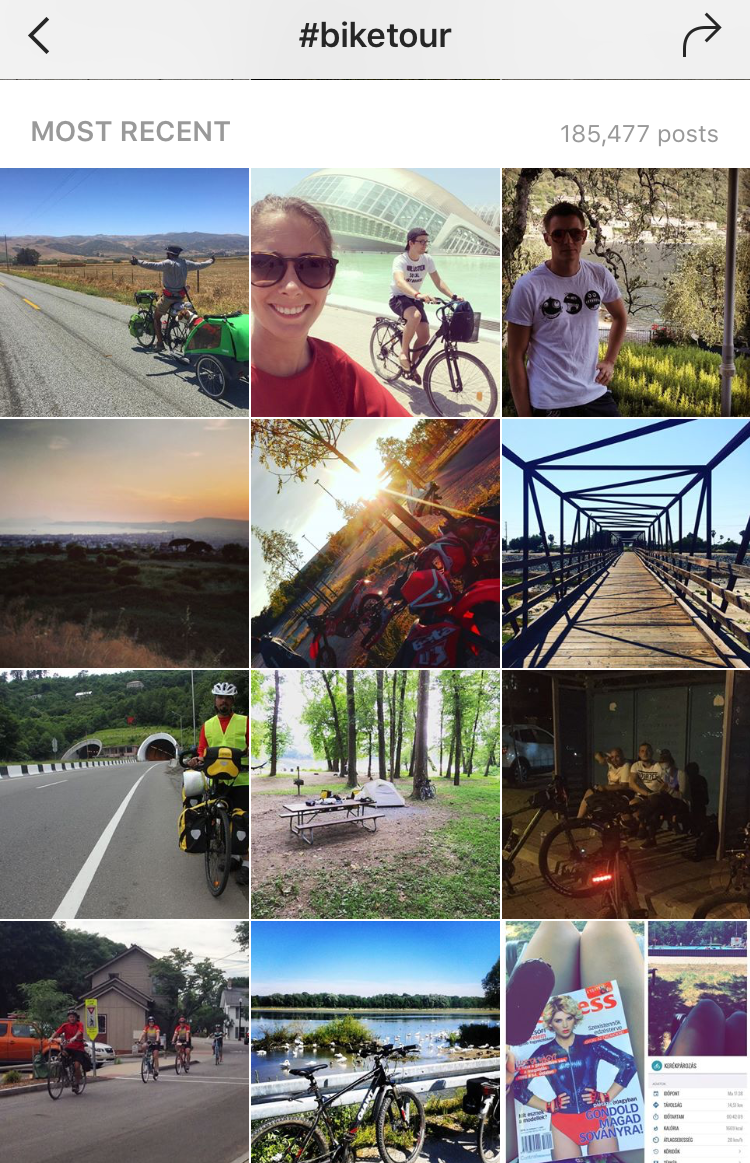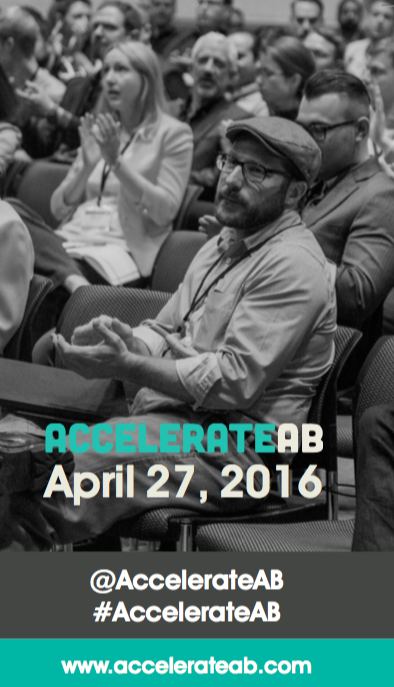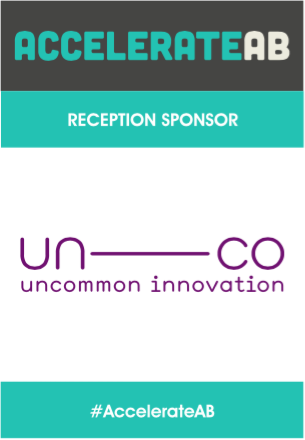Social Media Tips to Help You Promote Your Next Event
Social media is a powerful tool for engaging your audience and teaching them why they should attend your next event. In our first contribution to the Event Planning Toolkit, we cover three social media marketing strategies to help you get the right people in the room and to create buzz for events.
Social media is a powerful tool that not only lets you talk to your audience directly, but also lets you promote your next event. In this first blog post for our Event Planning Toolkit, we cover three social media marketing tips to help you get the right people in the room and create buzz for your events.
1. Create social media accounts for large events
Social media isn’t just intended for organizations. Your event deserves a voice too! Creating separate social media accounts for large events, such as conferences, will help you engage attendees and build a community year after year. It also makes it easier to build buzz and leverage past attendees to spread the word! They can also ask questions, reach out to others and set up meetings, and get a feel for the types of other attendees who will be “in the room”, so to speak.
The A100 organizes an annual conference called AccelerateAB. Both the organization and the event have social media accounts and they leverage one another to promote the event.
2. Create unique and memorable event hashtags
Event hashtags make it easy for social media users to follow conversations about your event. It’s important to make your hashtag unique, memorable and as short as possible (every character counts!)
Branch Out Neurological Foundation used #BranchyBikeTour rather than just #BikeTour so that its conversations didn’t get lost amongst the hundreds of other bike tours taking place around the same time.
Ensure your hashtag is listed on all of your event communications and marketing materials. This includes directional signage, attendee programs and table signage, to name a few.
Extra Tip: When attendees purchase tickets, encourage them to tell others and make it even easier by giving them a scripted post with the hashtag. For example:
Just purchased my ticket to #AccelerateAB! Looking forward to spending the day with the Alberta tech community on April 27 in Edmonton!
3. Use Click-to-Tweet to make it easy for others to promote your event
Want to make it even easier for busy people to start talking and tweeting about your event? Create easy-to-use Click-to-Tweets. Click-to-Tweet is a free tool that enables people to instantly publish your pre-scripted tweet with the push of a button. Here’s an example:
To create your own Click-to-Tweets:
- Go to Click-to-Tweet.com and “Sign in with Twitter”
- Write your tweet into the white message box and click “Generate New Link”. You will be provided with a shortened URL.
- You can either share this URL or hyperlink the tweet into an email or document so the reader can see the content before clicking
- Once the hyperlinked tweet is clicked, it will go directly to the individual's Twitter account
- At this point, they can either instantly post the pre-scripted content, or customize it before sharing
Now you are ready to get social!
Just remember, events are intended to be community builders. Engage your community online and prepare for your community to naturally expand as people start conversations about your event. Talk about building buzz!
Good luck!
-Team Catalystica
Why Events Should Be a Part of Your Marketing Strategy
Looking to connect with your audience? Host an event. Face to face events are all about making connections. Here are five benefits of hosting face to face events and why they still matter.
Originally posted on Picatic's Event Planning Blog on Sept 10, 2015
Looking to connect with your audience? Host an event.
Face to face events are all about making connections. Even though you can easily ‘connect’ with people online using social media, there is still something magical and unique about face to face interaction that you just can’t get behind a screen.
Here are five benefits of hosting face to face events and why they still matter:
Events build relationships
We’re human. We like to engage with other humans: shake other people’s hands, smile at one another and share jokes or use sarcasm to build rapport. At events, you can pick up on mannerisms and read others’ nonverbal body language, ultimately enabling you to build long-term relationships.
Social Media Breakfast YYC (SMBYYC) is a great example of a monthly networking event that builds strong relationships. This event brings online social media enthusiasts together so they can connect face to face (while tweeting of course!)
Events raise awareness and increase loyalty
Events give potential customers an opportunity to discover, compare, or try a brand before they purchase.
When engaged in one-on-one dialogue at an event, you have someone’s undivided attention. You can share your story in an authentic way and ultimately build loyalty, which is every marketers ultimate goal.
The Chic Geek hosts a Geeky Gathering (previously Speak Geek) event to discuss mentorship, goal setting and confidence building with its community members before launching applications for its 6-month Mentorship Program. This is a great event designed to help people determine whether they want to commit to the program.
Events create memories
Experiences that excite our senses – smell, sound, sight – help us form memories. This is all thanks to the little part in our brain called the hippocampus, which is “crucial for creating new memories for events.” (BBC)
Savoury food, delicious drinks, upbeat music, ambient lighting are all event elements that stimulate the senses and help you position your brand without even saying a word.
The adrenaline rush of Startup Weekend is an excellent example of a hackathon that stimulates the senses and creates life-long memories for participants.
Events stimulate word of mouth
Positive word of mouth is one of the most valuable forms of marketing. Period.
People want to be in the know and share cool experiences with their friends. Events enable you to invite others, share valuable info and relive the experience long after the event ends.
Traction Conf was a conference that brought the entire Vancouver startup community together. Everyone in tech was talking about the event – so much so, that it sold out 45 days early.
Events help you position your brand
Events are an excellent way to establish your brand in the marketplace. Whether it’s speaking at an event or just explaining to someone what your company does – it’s a live, authentic demonstration of your expertise.
In conclusion, face to face events help you build meaningful connections with your target audience. They help you create loyal advocates – which is the ultimate goal of any and every marketing campaign.
Visit the Picatic blog for additional event planning and event marketing tips.
Cut Through the Clutter with Experiential Marketing
Learn how to cut through advertising clutter using experiential marketing activities.
What is experiential marketing?
Experiential marketing is a form of advertising in which your consumer gets to experience your brand through their senses - taste, touch, sight, sound, and smell.
Experiential marketing isn’t a new concept or marketing buzzword; The term “experiential” was first coined by Alvin Toffler in his 1971 book “Future Shock” and expanded upon 30 years later by Joseph Pine and James Gilmore in “The Experience Economy.” Think about the last time you visited Costco and sampled that brand new popcorn mix. Or that time you attended an informative lunch & learn sponsored by ATB Financial. Or when you personalized your can of Coca Cola at Stampede.
As you can imagine, there are many creative ways to engage your consumers or clients at an experiential level.
But why does experiential marketing matter?
Two words: Advertising clutter.
Today, we are inundated with thousands of marketing messages each day. “We've gone from being exposed to about 500 ads a day back in the 1970's to as many as 5,000 a day today,” according to Jay Walker-Smith, President of marketing firm Yankelovich.
Strategic experiential marketing activities can help you cut through the advertising clutter. It can help your organization:
- Generate leads
- Strengthen relationships with existing clients or consumers
- Educate your consumers
- Position yourself as a thought leader
- Increase brand awareness
- Create lasting, memorable impressions
Experiential marketing for B2B
Experiential marketing can also be applied for business-to-business (B2B) companies. Here are some ideas:
Host an informative lunch and learn for your clients on a problem they currently face
Create a contest that gives your community members an opportunity submit an idea and organize an event to announce the winner
Attend a conference or community event and have your colleagues hand out samples or discount cards in exchange for a photo or social media mention
Organize a fundraiser and support an important cause while bringing your clients, colleagues and community members together
Implementing a successful experiential marketing campaign
The key to developing a successful experiential marketing campaign is to ensure you understand your target audience’s behaviours, hobbies, and needs.
For example, if you were interested in hiring software developers, you wouldn’t throw a huge office party with loud music, fancy food and a black tie dress code. (Well, you could always try). Instead, we recommend getting to know your existing software developers. Where do they hang out? What do they like to do? What kinds of events or Meetups do they attend?
Research their needs and then create an event or experience that they would be drawn to so you can remove as many barriers to engagement as possible.
Do you have examples of successful experiential marketing campaigns that you’ve implemented or taken part in? Share them below!


